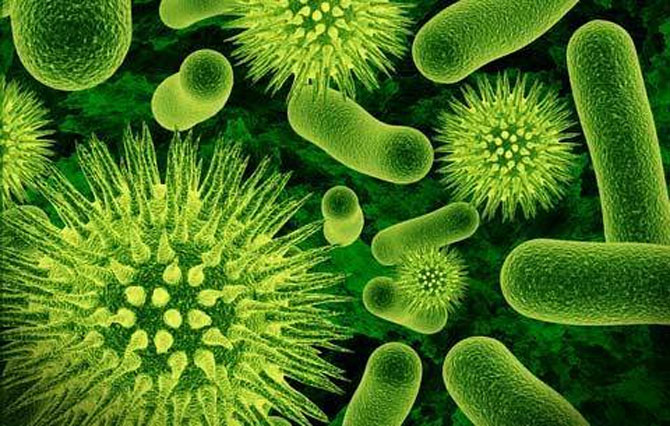Doc Confesses He Nearly Took Unnecessary Antibiotics

Get the world’s most fascinating discoveries delivered straight to your inbox.
You are now subscribed
Your newsletter sign-up was successful
Want to add more newsletters?

Delivered Daily
Daily Newsletter
Sign up for the latest discoveries, groundbreaking research and fascinating breakthroughs that impact you and the wider world direct to your inbox.

Once a week
Life's Little Mysteries
Feed your curiosity with an exclusive mystery every week, solved with science and delivered direct to your inbox before it's seen anywhere else.

Once a week
How It Works
Sign up to our free science & technology newsletter for your weekly fix of fascinating articles, quick quizzes, amazing images, and more

Delivered daily
Space.com Newsletter
Breaking space news, the latest updates on rocket launches, skywatching events and more!

Once a month
Watch This Space
Sign up to our monthly entertainment newsletter to keep up with all our coverage of the latest sci-fi and space movies, tv shows, games and books.

Once a week
Night Sky This Week
Discover this week's must-see night sky events, moon phases, and stunning astrophotos. Sign up for our skywatching newsletter and explore the universe with us!
Join the club
Get full access to premium articles, exclusive features and a growing list of member rewards.
A Kentucky doctor recently had an ironic experience — while attending a conference where researchers would discuss the unnecessary use of antibiotics, he almost wound up taking an antibiotic unnecessarily himself.
Another doctor had prescribed the antibiotic for him, and the experience gave him insight into how hard it is for patients to disagree with their physicians when they have doubts about the doctor's choices.
Dr. Kevin Kavanagh, board chairman of Health Watch USA, a patient advocacy group, was attending a conference on antibiotic-resistant bacteria, when he woke up with a sore throat. He felt feverish and weak, and went to an urgent care clinic to get tested for a Streptococcus (Strep) infection.
The throat culture was negative, meaning Kavanagh didn't have a bacterial infection, but the doctor at the clinic recommended that Kavanagh take antibiotics anyway. The clinic doctor said that there was a lot of illness "going around" and that the test results were not always right. What's more, the doctor suggested Kavanagh take an antibiotic that works well on lower respiratory infections caused by bacteria, even though Kavanagh had an upper respiratory infection, likely caused by a virus. [6 Superbugs to Watch Out For]
"Having just attended a conference on antibiotic resistance, I knew that I should not take an antibiotic needlessly, and I most certainly should not take the wrong antibiotic for a sore throat," Kavanagh wrote in the Aug. 4 issue of the journal JAMA Internal Medicine. "But knowledge is not enough."
"When you're sick, you're not going to sit there and argue for a half hour," Kavanagh told Live Science about his experience. "It's much easier to get the prescription."
Kavanagh ended up not filling his prescription, and his sore throat — which was likely caused by a virus, and would not have been helped by taking antibiotics — went away on its own in a few days.
Get the world’s most fascinating discoveries delivered straight to your inbox.
"Looking back, my own willingness to go along with 'doctor’s orders,' or at least not argue with him when he wrote a prescription, gave me a glimmer of insight into how hard it is for patients to express concerns when in the presence of a figure of authority on whom they are dependent," Kavanagh wrote.
Kavanagh said some physicians are under the impression that patients "pressure" their doctors for unnecessary antibiotics. But his experience "really emphasized the fact that we shouldn't be sitting around blaming patients for all the problems in medicine," Kavanagh said. "Doctors at some point really need to take ownership of the problem, and start to correct their behavior."
Kavanagh noted that doctors are supposed to act as the "gatekeepers" of prescription drugs, so the physicians are responsible, even if the patient asks for an unnecessary prescription.
Antibiotic drugs come with the small, but real risk that a patient taking the drugs will get another harmful bacterial infection, and so patients should take these drugs only if they actually need to, Kavanagh said. Some studies show that people who take antibiotics are five times more likely to get food poisoning than people who aren't taking antibiotics, Kavanagh said.
"We live in harmony with millions of bacteria … they help us fight infections, and [if] you kill off those bacteria with antibiotics, you're then going to be more likely to get infections with pathological bacteria," Kavanagh said.
Overuse of antibiotics also increases the likelihood that bacteria will become resistant to the drugs, and doctors are running out of effective antibiotics to treat some bacterial infections.
"Had I filled the prescription and taken the medicine, I may have contributed to the serious and growing problem of antibiotic resistance," Kavanagh wrote. "All the conferences in the world will not put a dent in antibiotic overuse unless the medical profession owns the problem and changes its own habits."
Follow Rachael Rettner @RachaelRettner. Follow Live Science @livescience, Facebook & Google+. Original article on Live Science.

Rachael is a Live Science contributor, and was a former channel editor and senior writer for Live Science between 2010 and 2022. She has a master's degree in journalism from New York University's Science, Health and Environmental Reporting Program. She also holds a B.S. in molecular biology and an M.S. in biology from the University of California, San Diego. Her work has appeared in Scienceline, The Washington Post and Scientific American.
 Live Science Plus
Live Science Plus





